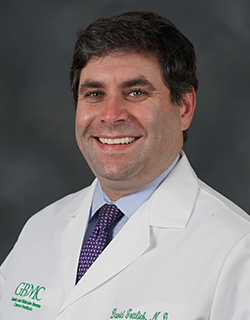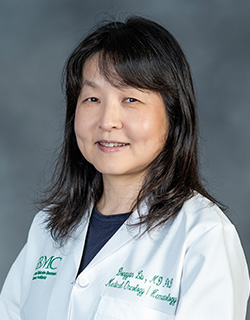Ask an Oncology Expert with Dr. David F. Gottlieb
December 15, 2022David F. Gottlieb, MD, is a medical oncologist and hematologist at the Sandra and Malcolm Berman Cancer Institute at GBMC. He earned his medical degree from Albany Medical College and completed residency and fellowship training at the University of Maryland Medical Center where he was elected to the Gold Humanism Honor Society. Dr. Gottlieb believes in a patient-centered approach that prioritizes open communication and shared decision-making with the goal of providing evidence-based, compassionate care.
On Wednesday, December 14, Dr. Gottlieb shared a wealth of knowledge on various blood cancers and disorders and how to treat them. Dr. Gottlieb is a recent addition to the Berman Cancer Institute and was drawn to our team because of the collaborative, community environment.
Here are some key takeaways Dr. Gottlieb shared:
- There are three ways to treat cancer: surgically removing the cancer, targeting the tumor with radiation, and medically treating the disease. For some patients, a combination of all three is the key; for others, especially those with blood cancers, targeted immunotherapy is the best treatment option. GBMC's Medical Oncology team works collaboratively to be sure each patient's care plan is individualized to their needs.
- There are a variety of different blood disorders that can be benign and not considered cancerous. However, there are blood cancers that are also considered blood disorders. Dr. Gottlieb and his team treat all types of blood cancers and disorders, the most common being leukemia. Dr. Gottlieb shared that while there is a genetic predisposition to some cancers (like breast) there is not for blood cancers or disorders.
- Multiple Myeloma is a cancer that forms in a type of white blood cell called a plasma cell. When your plasma cells are healthy, they help you to fight infections by making antibodies that attack viruses and germs. With Multiple Myeloma, those cancerous plasma cells accumulate in the bone marrow and crowd out healthy cells. So, instead of producing helpful antibodies, those cancerous cells produce proteins that can cause problems. At this time, there is no cure for Multiple Myeloma, but there are ways to manage the disease such as targeted chemotherapy and immunotherapy and/or bone marrow transplants.
Dr. Gottlieb finds feedback from patients and loved ones helpful for the medical teams. He also enjoys working with GBMC volunteers in the oncology department. If you wish to support the Sandra and Malcolm Berman Cancer Institute, Dr. Gottlieb said the best way is to donate. Please consider a donation to the Cancer Institute today.





